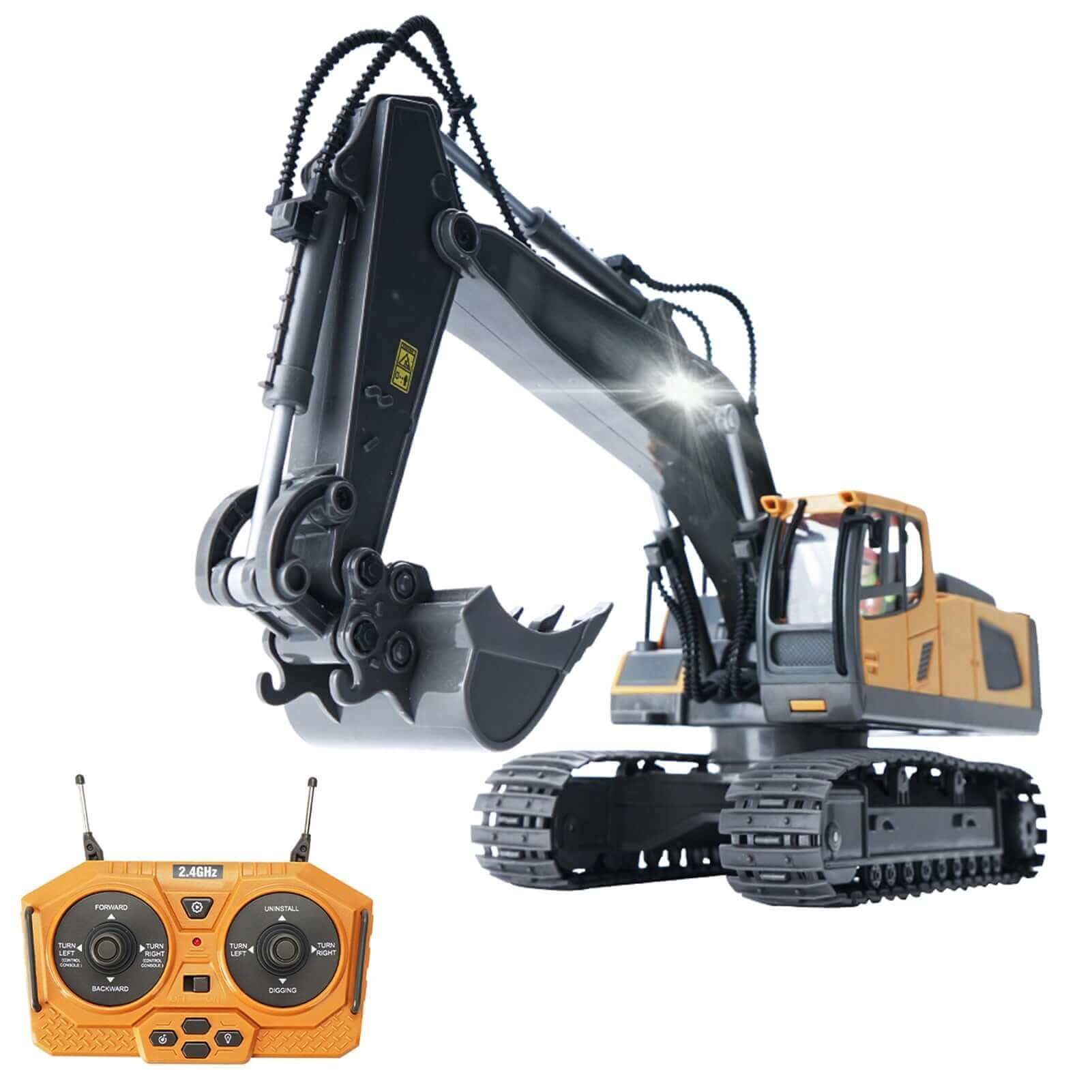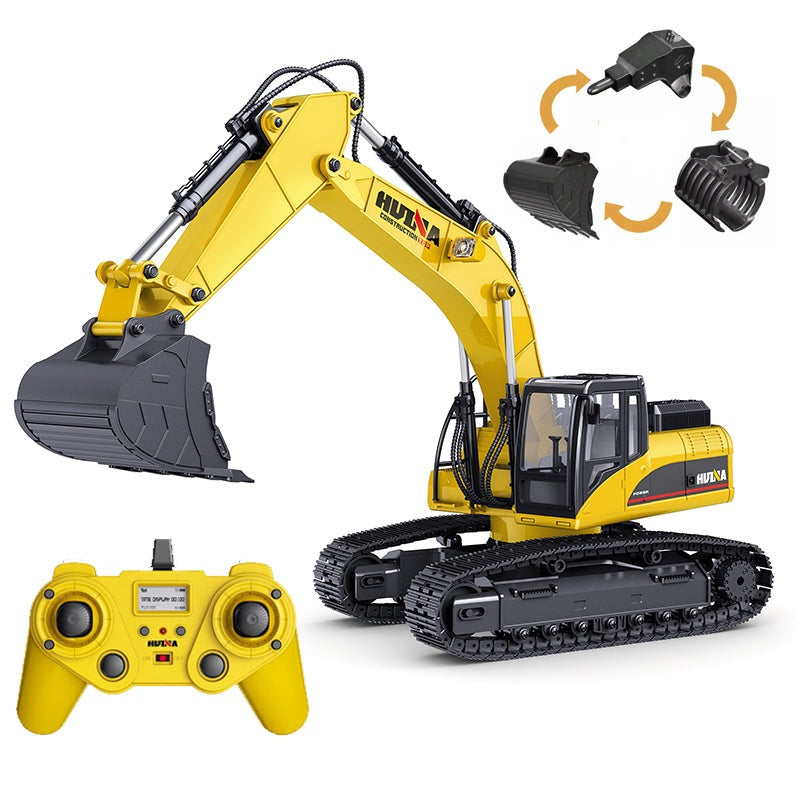Exploring the Key Features of the rc excavator for Modern Construction
Understanding How Excavator Functions and Its Influence On Efficiency
Excavators play an essential role in building and mining operations, counting on a complicated interaction of mechanical and hydraulic systems. Their ability to carry out a variety of tasks pivots on both their layout and the innovation incorporated within. Comprehending these components can considerably affect operational effectiveness and performance. As advancements continue to reshape the market, one should take into consideration just how these changes will affect future methods and performance.
The Basics of Excavator Mechanics

The Function of Hydraulic Equipments in Excavators
At the heart of excavator procedure exists the hydraulic system, which plays a critical function in powering the equipment's functions and activities. This system utilizes pressurized hydraulic liquid to transfer power, enabling various actions such as lifting, excavating, and moving. By taking advantage of the concepts of hydraulics, excavators can carry out tasks with exceptional accuracy and force, boosting total functional efficiency.The hydraulic system includes key elements, consisting of valves, cylinders, and pumps, which function together to regulate the flow and direction of the fluid. When the driver involves the controls, the hydraulic fluid is directed to details cylinders, converting the operator's commands into physical movement. This mechanism enables smooth and receptive actions, which are crucial in construction and excavation settings. double e volvo rc excavator. The performance of the hydraulic system directly affects the productivity and adaptability of the excavator, making it a crucial aspect in contemporary excavation processes
Secret Components of an Excavator
Comprehending the essential parts of an excavator is essential for grasping just how this effective maker operates. An excavator contains several significant aspects, including the undercarriage, home, arm, boom, and bucket. The undercarriage gives security and movement, frequently featuring tracks or wheels to navigate numerous terrains. The residence includes the engine and hydraulic systems, permitting the driver to regulate movement and power the equipment. The boom prolongs from the house, enabling vertical reach, while the arm links to the bucket, assisting in excavating and lifting operations.Additionally, the taxi houses the operator, geared up with controls for specific maneuvering. Each of these elements plays an important function in the excavator's total performance, adding to its effectiveness and efficiency on construction sites. Comprehending these components assists in optimizing and keeping excavator performance, making certain tasks are completed safely and efficiently.
Add-on Convenience and Its Benefits
Add-on flexibility is a crucial aspect of excavators, making it possible for operators to switch over between different devices tailored for details tasks. This flexibility not only boosts job efficiency but also adds to cost-effectiveness by lowering the demand for several equipments. Understanding the various kinds of attachments readily available can substantially influence the general efficiency and capability of an excavator on job websites.
Types of Accessories
While excavators are mainly identified for their excavating capabilities, their true adaptability depends on the vast variety of add-ons offered. These add-ons improve the excavator's functionality, permitting it to perform different tasks past excavation. Common attachments include pails (for digging and scooping), hydraulic thumbs (for grasping products), and augers (for drilling openings) Grapples are utilized for moving and managing particles, while rippers can separate hard surfaces. Various other specialized attachments, such as trenchers and plows, make it possible for excavators to adapt to certain work requirements. This diversity not only increases the equipment's utility throughout various markets, including demolition, construction, and landscape design, however also enables drivers to tailor their devices to meet particular job needs effectively.
Boosted Task Performance
Taking full advantage of task efficiency is a main benefit of using various excavator accessories. Different attachments allow an excavator to execute multiple jobs without requiring to switch equipment, conserving valuable time and labor. As an example, making use of a hydraulic hammer can damage concrete while a container accessory can excavate soil, making it possible for a smooth process. This flexibility decreases downtime related to equipment adjustments and enhances productivity on-site. Additionally, specialized add-ons improve accuracy in jobs such as grading or landscape design, resulting in better end results. The ability to adapt to different task requirements not only enhances operations however likewise lessens the demand for added equipment, making sure that jobs are finished quickly and efficiently. Generally, add-on convenience substantially contributes to increased job efficiency in excavation job.
Cost-Effectiveness and Versatility
Cost-effectiveness is a significant benefit of utilizing flexible excavator attachments. These add-ons allow a single excavator to do numerous jobs, decreasing the requirement for added equipment and labor - double e volvo rc excavator. By switching between containers, hammers, and grapples, operators can deal with numerous jobs, from excavating to demolition, thus making best use of devices use. This flexibility not only decreases operational prices but also minimizes downtime related to changing tools. In addition, the capacity to customize excavators with specialized accessories boosts performance, as they can efficiently manage varied tasks according to project demands. To end, the mix of cost-effectiveness and convenience in excavator accessories adds to enhanced operational effectiveness and source allowance in construction and excavation jobs

Advanced Technology in Modern Excavators
Modern excavators are progressively equipped with advanced modern technology that changes excavation procedures. Automation streamlines procedures, while enhanced gas performance lowers functional expenses. Furthermore, smart control systems improve accuracy and safety and security, noting a substantial development in excavation devices.
Automation in Excavation Processes
As excavation modern technology evolves, automation has actually arised as a critical part in enhancing efficiency and accuracy on job sites. Modern excavators are geared up with advanced automated systems that facilitate tasks such as grading, digging, and trenching with marginal driver treatment. These systems utilize sensing units, GPS, and equipment knowing algorithms to assure precise positioning and depth control, considerably minimizing the margin for error. Additionally, automation permits drivers to concentrate on tactical decision-making instead of hands-on controls, leading to enhanced productivity on the whole. Such advancements not just improve workflows however likewise boost safety by reducing human mistake in intricate operations. The assimilation of automation in excavation processes represents a considerable innovation in building and construction modern technology, driving the industry in the direction of better effectiveness and effectiveness.
Enhanced Gas Effectiveness
Improvements in technology have also led to significant enhancements in fuel performance for contemporary excavators. Modern devices are equipped with sophisticated engines that optimize power result while reducing fuel usage. These engines make use of innovative combustion technologies, such as turbocharging and straight gas shot, to improve efficiency and efficiency. In addition, light-weight products in building and construction lower overall weight, permitting much less power expense throughout operation. The introduction of variable rate controls allows drivers to change engine performance according to details jobs, better minimizing gas use. As an outcome, these improvements not just reduced functional prices yet additionally contribute to ecological sustainability by minimizing exhausts. Overall, boosted fuel performance in excavators is a vital advancement that bolsters efficiency and financial feasibility in the building sector.
Smart Control Equipment
While operators navigate progressively intricate work sites, clever control systems in excavators have become vital devices for enhancing performance and precision. These advanced modern technologies utilize formulas and sensing units to check various criteria such as lots weight, terrain conditions, and operational efficiency. By immediately changing hydraulic features, clever systems maximize device efficiency, leading to boosted productivity and other reduced endure parts. Additionally, drivers benefit from user-friendly user interfaces that provide real-time responses and diagnostics, enabling for educated decision-making. This assimilation of technology not just streamlines procedures yet likewise minimizes human error, adding to more secure work atmospheres. As the building and construction sector continues to evolve, smart control systems will certainly play a vital function in shaping the future of excavator effectiveness and effectiveness.
Enhancing Operational Efficiency With Excavators
Excavators play a vital duty in enhancing functional efficiency across various building and excavation jobs. Their flexibility permits several tasks, including lifting, excavating, and product handling, which streamlines workflows and lowers the requirement for additional tools. With effective hydraulic systems, Get More Info excavators can perform sturdy tasks with accuracy, substantially decreasing the moment called for to full jobs. The integration of innovative technology, such as GPS and automated controls, further optimizes their operation, enabling operators to attain better precision and decrease product waste. Furthermore, modern-day excavators are created to take in less gas and lessen emissions, adding to both cost financial savings and environmental sustainability. By utilizing excavators successfully, building and construction groups can enhance productivity, satisfy task due dates, and enhance overall website administration. This multifunctionality and efficiency make excavators indispensable tools in the contemporary building and construction landscape.
The Future of Excavators in Building And Construction and Mining Industries
As the building and mining industries evolve, the future of excavators is positioned for significant transformation driven by technical technology and altering functional needs. Advancements in automation and expert system are improving excavator abilities, enabling enhanced accuracy and effectiveness in operations. Self-governing excavators are emerging, decreasing the need for human treatment and decreasing the risk of accidents.Moreover, the assimilation of telematics and IoT modern technology makes it possible for real-time tracking of machine efficiency and anticipating upkeep, optimizing uptime. Green styles, consisting of hybrid and electric versions, are gaining traction, straightening with sustainability objectives within the industry.Additionally, using innovative products and lighter layouts boosts gas efficiency while keeping efficiency standards. As these patterns progression, excavators will play a vital function in satisfying the raising demands for performance and safety and security in construction and mining, inevitably transforming operational landscapes.
Frequently Asked Questions
Just How Do Weather Impact Excavator Performance?

Weather considerably affect excavator efficiency, as rain and mud can impede grip and stability, while severe temperatures may affect hydraulic systems. Operators has to adapt to these variables to guarantee optimal functionality and safety throughout procedures.
What Safety And Security Actions Should Operators Comply With While Utilizing Excavators?
Security steps for excavator operators consist of putting on suitable personal protective devices, carrying out pre-operation evaluations, guaranteeing correct interaction with ground workers, preserving a safe range from above hazards, and sticking to established functional methods to stop accidents.
How Usually Should Excavators Be Preserved for Optimum Performance?
Excavators need to be kept consistently to assure peak performance, typically every 250 operating hours or as defined by the manufacturer. Regular checks enhance dependability, prevent unanticipated failures, and extend the life-span of the tools.
What Is the Ordinary Lifespan of an Excavator?
The typical life expectancy of an excavator normally ranges from 10,000 to 15,000 hours of procedure. Variables affecting durability consist of upkeep practices, running problems, and the high quality of the equipment itself, affecting general productivity and performance.

Can Excavators Operate on Uneven Surface Effectively?
Excavators can run efficiently on unequal terrain because of their articulated designs and adjustable tracks. These features enable them to preserve stability and grip, making it possible for effective procedure in tough settings frequently run into in building and landscape design tasks. Each of these parts plays an essential duty in the excavator's general performance, contributing to its effectiveness and effectiveness on building and construction sites. Making the most of job efficiency is a main advantage of making use of numerous excavator add-ons. While drivers navigate progressively intricate job websites, read here clever control systems in excavators have actually arised as crucial devices for improving performance and precision. Excavators play an essential duty in enhancing operational efficiency across various building and construction and excavation jobs. Advancements in automation and fabricated intelligence are improving excavator capabilities, enabling for boosted precision and efficiency in procedures.